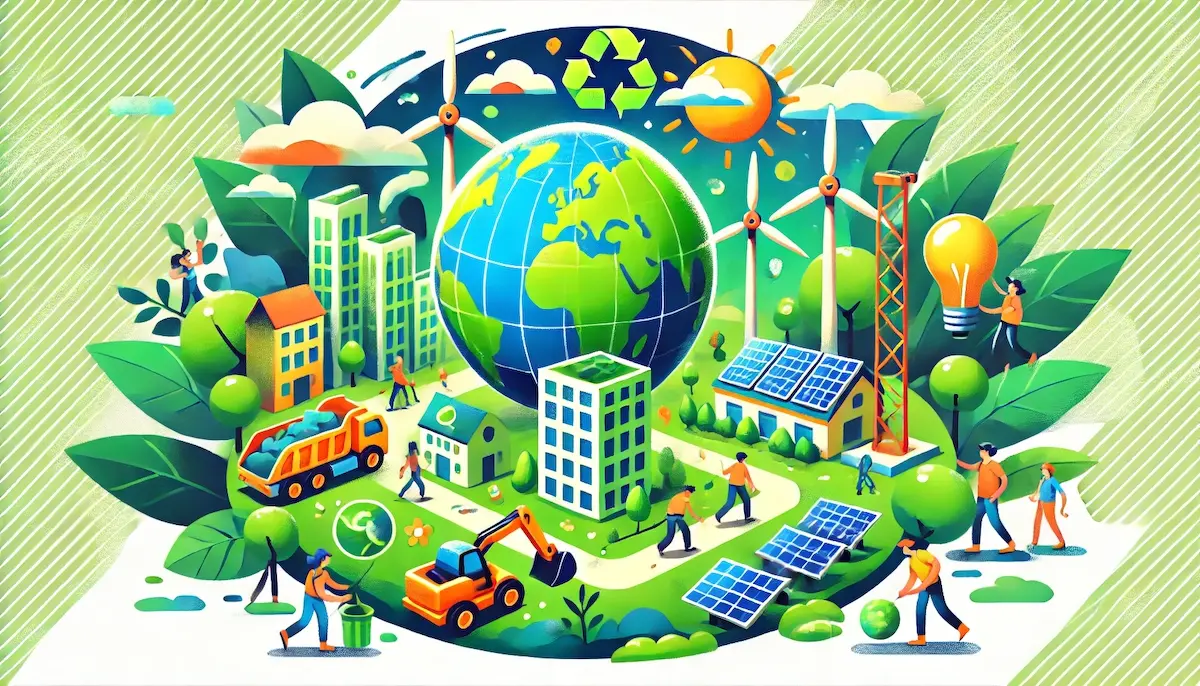Sustainable development is a holistic approach to growth and progress, aiming to meet the needs of the present without compromising the ability of future generations to meet their own needs. It balances economic growth, social inclusion, and environmental protection, ensuring a harmonious and equitable development for all.
What is Sustainable Development?
Sustainable development integrates three core elements: economic development, social inclusion, and environmental sustainability. It seeks to create a world where everyone has access to the resources and opportunities needed for a fulfilling life, while protecting the planet’s natural resources and ecosystems.
The Three Pillars of Sustainable Development
Economic Development
Economic development focuses on creating wealth and improving living standards. Sustainable economic development ensures that economic growth does not come at the expense of environmental health or social equity. It promotes:
- Inclusive Growth: Economic opportunities should be accessible to everyone, reducing poverty and inequality.
- Innovation and Efficiency: Using resources more efficiently and fostering innovation can drive sustainable economic growth.
- Resilient Economies: Building economies that can withstand shocks and stresses, such as financial crises or natural disasters.
Social Inclusion
Social inclusion ensures that all people, regardless of their background or circumstances, have equal opportunities to participate in and benefit from economic and social progress. Key aspects include:
- Equity and Justice: Ensuring fair access to resources, opportunities, and services, and protecting human rights.
- Health and Education: Providing access to quality healthcare and education, which are fundamental for personal and community development.
- Empowerment and Participation: Encouraging the participation of all individuals in decision-making processes that affect their lives.
Environmental Sustainability
Environmental sustainability involves protecting and managing the planet’s natural resources to ensure they can support current and future generations. It emphasizes:
- Conservation: Preserving biodiversity and ecosystems, which provide essential services like clean air and water, pollination, and climate regulation.
- Renewable Resources: Promoting the use of renewable resources and sustainable practices to reduce environmental degradation.
- Climate Action: Addressing climate change by reducing greenhouse gas emissions, promoting renewable energy, and enhancing resilience to climate impacts.
Sustainable Development Goals (SDGs)
In 2015, the United Nations adopted the 2030 Agenda for Sustainable Development, which includes 17 Sustainable Development Goals (SDGs). These goals provide a comprehensive framework for addressing the world’s most pressing challenges. Some key SDGs include:
- No Poverty: End poverty in all its forms everywhere.
- Zero Hunger: Achieve food security and improved nutrition, and promote sustainable agriculture.
- Good Health and Well-being: Ensure healthy lives and promote well-being for all at all ages.
- Quality Education: Ensure inclusive and equitable quality education and promote lifelong learning opportunities for all.
- Gender Equality: Achieve gender equality and empower all women and girls.
- Clean Water and Sanitation: Ensure availability and sustainable management of water and sanitation for all.
- Affordable and Clean Energy: Ensure access to affordable, reliable, sustainable, and modern energy for all.
- Decent Work and Economic Growth: Promote sustained, inclusive, and sustainable economic growth, full and productive employment, and decent work for all.
- Industry, Innovation, and Infrastructure: Build resilient infrastructure, promote inclusive and sustainable industrialization, and foster innovation.
- Reduced Inequality: Reduce inequality within and among countries.
- Sustainable Cities and Communities: Make cities and human settlements inclusive, safe, resilient, and sustainable.
- Responsible Consumption and Production: Ensure sustainable consumption and production patterns.
- Climate Action: Take urgent action to combat climate change and its impacts.
- Life Below Water: Conserve and sustainably use the oceans, seas, and marine resources for sustainable development.
- Life on Land: Protect, restore, and promote sustainable use of terrestrial ecosystems, manage forests sustainably, combat desertification, and halt and reverse land degradation and halt biodiversity loss.
- Peace, Justice, and Strong Institutions: Promote peaceful and inclusive societies for sustainable development, provide access to justice for all, and build effective, accountable, and inclusive institutions at all levels.
- Partnerships for the Goals: Strengthen the means of implementation and revitalize the global partnership for sustainable development.
Challenges and Implementation
Challenges
- Resource Constraints: Balancing economic growth with the finite nature of natural resources.
- Climate Change: Addressing the impacts of climate change while promoting sustainable development.
- Inequality: Reducing disparities within and between countries.
- Policy and Governance: Ensuring effective policies and governance structures that support sustainable development goals.
Implementation
- Policy Integration: Incorporating sustainable development principles into national and international policies and strategies.
- Public Awareness: Raising awareness and educating people about the importance of sustainable development.
- Collaboration: Encouraging partnerships among governments, businesses, civil society, and international organizations.
- Innovation and Technology: Leveraging technology and innovation to drive sustainable solutions.
Conclusion
Sustainable development is essential for creating a prosperous, equitable, and environmentally sustainable world. By integrating economic growth, social inclusion, and environmental protection, we can ensure a better future for all. The journey towards sustainable development requires collective action, innovative solutions, and a commitment to the well-being of current and future generations.
Blockfine thanks you for reading and hopes you found this article helpful.
